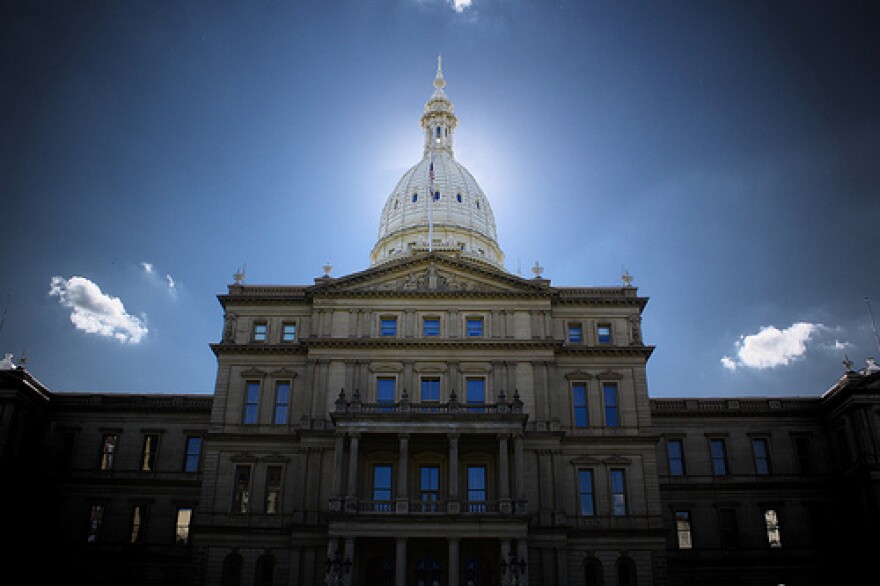Anyone in need of a biscuit? A lump of sugar? Grab a cuppa, because it’s time for a Tea Party edition of It’s Just Politics. And we think this classic quote from Maxwell Smart kind of sums up this past week for the Tea Party in Michigan: “Missed it by this much…”
A Tea Party insurgency at last weekend’s state Republican convention came very close to unseating incumbent Michigan Republican Party Chairman Bobby Schostak.

“Missed it by this much…”
For whatever reasons, Schostak has never been able to convince a wide swath of the Tea Party that he’s one of them. Also, Governor Rick Snyder – once again – bucked the Tea Party to back the Medicaid expansion (an option part of Obamacare). The state would get federal money to add hundreds of thousands of people to Medicaid. It’s part of the Governor’s budget. He’s still trying to sell that. But this week, the state House Republican leadership did something that for the last two years was unthinkable – it passed legislation with a majority made up of more Democrats than Republicans.
Twenty-nine House Republicans nervously brushed off a full-throttled Tea Party effort to reject federal funds to set up a partnership online exchange – between the state and the federal government –to sell health insurance. Another big part of Obamacare.
There was a big push – e-mails, phone calls, frantic Facebook shout-outs to stop this from happening: Warnings to lawmakers that this is a scorecard vote – a measure of ideological purity. And the Tea Party lost this one. Forty-nine Democrats voted for it; thirty Republicans voted against it.
“Missed it by this much…”
This is a big deal. In Lansing, in the state House, in the last session, the rule was nothing moved unless a majority of Republicans were for it. On this vote, the majority was forty-nine Democrats, twenty-nine Republicans. It’s a world - or, really, a State House -turned upside down. That’s got us wondering if this is a new reality in Republican politics: Republican elected officials telling their Tea Parties to settle down,
not to worry so much.
Last year, chambers of commerce, local businesses, went to their Republican legislators and asked them to support a new international bridge in Detroit and to support a state-run health insurance exchange. They were told, basically, “I love my businesses, but I fear my Tea Party.” Now, they’re saying to their Tea Partiers, “we need to be practical.”
State Representative Mike Shirkey says it’s time to be practical, “There are ways to approach this to assert Michigan’s rights and try and make chicken soup out of chicken poop.” Now Mike Shirkey is no RINO –Republican In Name Only. He’s a conservative by any definition of conservative. Ardently, stridently, pro-life. Anti-tax. He’s a Tea Party hero. This is the guy who sponsored a right-to-work bill while Governor Snyder was trying to keep it off his agenda.
So Michigan legislators with gilded Tea Party bona fides are showing some independence. The Tea Party – and Republicans – are confronting the tensions that come with being part of a political coalition. You don’t want to give up on your beliefs, your principles. But you have to sometimes for at least some of those principles to prevail.
We’re seeing this nationally in the fight between the Tea Party and once and maybe future Republican oracle Karl Rove. Rove says Republicans need to move back toward the center, to choose the candidates to win. In the not-so-distant past, the Tea Party was able to have it both ways. In 2010, the conservative candidate won in most cases. Two thousand and twelve was a mixed bag for Republicans and Democrats in Michigan. So, in 2013, and looking ahead to elections in 2014, we seem to have returned to a more-complex political reality - which is a big part of what makes the game of politics so much fun for people like us. We’ll be looking at these votes in the Legislature on health insurance exchanges, the Medicaid expansion, also gas taxes and road funding, as barometers of how the Republican political class now views the demands of the Tea Party compared to their future political prospects.









